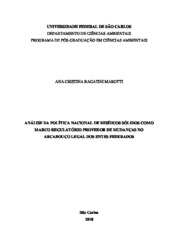| dc.contributor.author | Marotti, Ana Cristina Bagatini | |
| dc.date.accessioned | 2018-06-11T23:23:11Z | |
| dc.date.available | 2018-06-11T23:23:11Z | |
| dc.date.issued | 2018-06-08 | |
| dc.identifier.citation | MAROTTI, Ana Cristina Bagatini. Análise da política nacional de resíduos sólidos como marco regulatório provedor de mudanças no arcabouço legal dos entes federados. 2018. Dissertação (Mestrado em Ciências Ambientais) – Universidade Federal de São Carlos, São Carlos, 2018. Disponível em: https://repositorio.ufscar.br/handle/ufscar/10148. | * |
| dc.identifier.uri | https://repositorio.ufscar.br/handle/ufscar/10148 | |
| dc.description.abstract | The National Policy of Solid Waste (NPSW), established by Law nº 12,305 of 2010, is the principal policy on solid waste management in the country. The intention of this dissertation is to evaluate the NPSW as a regulatory mark that provides changes in the legislations of the three levels of government, national, state and municipal, until the year 2017. The methodological aspects included documentary analyzes of the national normative and legal framework for solid waste management and before the validation the expert panel method; analyzes of the state solid waste policies published; and a case study in the municipality of Rio de Janeiro referring to municipal legislation. The selection of the municipality was due to the easiness of access and availability to its legal framework and the national importance that the municipality represents. These analyzes are based on transformations of these frameworks, national and municipal, and the state policies against the NPSW’s publication. The results showed that NPSW is a mark for solid waste management and that it was, in part, a provider of changes in the legal framework of the federated entities, because the current national framework is consisted by 77% of legal parts published until 2009, and 23% after this year which have influenced the content established by the NPSW. Despite the changes resulting from the NPSW, some institutions provided by law do not correspond to norms and regulations, impacting on their effectiveness. About the state policies, 30% were published after 2010, or underwent updates to suit national policy, but 26% of states do not yet have their own policies. In the city of Rio de Janeiro, the PMGIRS was published after the promotion of the NPSW, although it presented laws and decrees that encouraged the creation of a plan in pre-2010 years. Thus, the NPSW as a normative and regulatory framework was responsible for providing some changes in the national, state and municipal legal frameworks, but still presenting weaknesses in its execution. | eng |
| dc.description.sponsorship | Coordenação de Aperfeiçoamento de Pessoal de Nível Superior (CAPES) | por |
| dc.language.iso | por | por |
| dc.publisher | Universidade Federal de São Carlos | por |
| dc.rights.uri | Acesso aberto | por |
| dc.subject | Política Nacional de Resíduos Sólidos | por |
| dc.subject | Lei nº 12305 | por |
| dc.subject | Políticas públicas | por |
| dc.subject | Resíduos sólidos | por |
| dc.subject | Gestão integrada | por |
| dc.subject | National Policy of Solid Waste | eng |
| dc.subject | Law nº 12.305 | eng |
| dc.subject | Public policy | eng |
| dc.subject | Solid waste | eng |
| dc.subject | Integrated management | eng |
| dc.title | Análise da política nacional de resíduos sólidos como marco regulatório provedor de mudanças no arcabouço legal dos entes federados | por |
| dc.type | Dissertação | por |
| dc.contributor.advisor1 | Pugliesi, Érica | |
| dc.contributor.advisor1Lattes | http://lattes.cnpq.br/6736386099280623 | por |
| dc.description.resumo | A Política Nacional de Resíduos Sólidos (PNRS), instituída pela lei nº 12.305 de 2010, é a principal normativa que dispõe sobre a gestão dos resíduos sólidos no país. Neste trabalho, pretendeu-se avaliar a PNRS como um marco regulatório provedor de mudanças nas legislações dos três níveis de governo, nacional, estadual e municipal, até o ano de 2017. Os aspectos metodológicos contemplaram análises documentais do arcabouço normativo e legal nacional de gestão e gerenciamento de resíduos sólidos e posterior validação por meio do método de painel de especialistas; análises das políticas estaduais de resíduos sólidos publicadas; e um estudo de caso no município do Rio de Janeiro referente às legislações municipais.A seleção do município se deu pela facilidade de acesso e disponibilidade dos dados, e pela importância nacional que o município apresenta. Os resultados demonstraram que a PNRS é um marco para a gestão de resíduos sólidos e que foi, em partes, provedora de mudanças no arcabouço legal dos entes federados. O conjunto de leis e normativas é constituído por 77% de peças publicadas até o ano de2009 e 23% posteriores, as quais apresentaram influências do conteúdo instituído pela PNRS. Apesar das mudanças decorrentes da PNRS, algumas instituições dadas pela lei não apresentam correspondência com normas e regulamentos, impactando em sua efetivação. Sobre as políticas estaduais, 30% foram publicadas após 2010, ou passaram por atualizações para adequação ao disposto na política nacional, porém 26% dos estados ainda não apresentam políticas próprias. No município do Rio de Janeiro, o PMGIRS foi publicado após a PNRS, apesar de apresentar leis e decretos que nutriam a proposição de um plano em anos anteriores a 2010. Dessa forma, a PNRS como marco normativo e regulatório foi responsável por prover algumas mudanças nos arcabouços legais nacional, estadual e municipal, porém ainda apresentando fragilidades em sua execução. | por |
| dc.publisher.initials | UFSCar | por |
| dc.publisher.program | Programa de Pós-Graduação em Ciências Ambientais - PPGCAm | por |
| dc.subject.cnpq | ENGENHARIAS::ENGENHARIA SANITARIA::SANEAMENTO AMBIENTAL::LEGISLACAO AMBIENTAL | por |
| dc.subject.cnpq | ENGENHARIAS::ENGENHARIA SANITARIA::SANEAMENTO BASICO::RESIDUOS SOLIDOS, DOMESTICOS E INDUSTRIAIS | por |
| dc.ufscar.embargo | Online | por |
| dc.publisher.address | Câmpus São Carlos | por |
| dc.contributor.authorlattes | http://lattes.cnpq.br/0882292538928826 | por |
